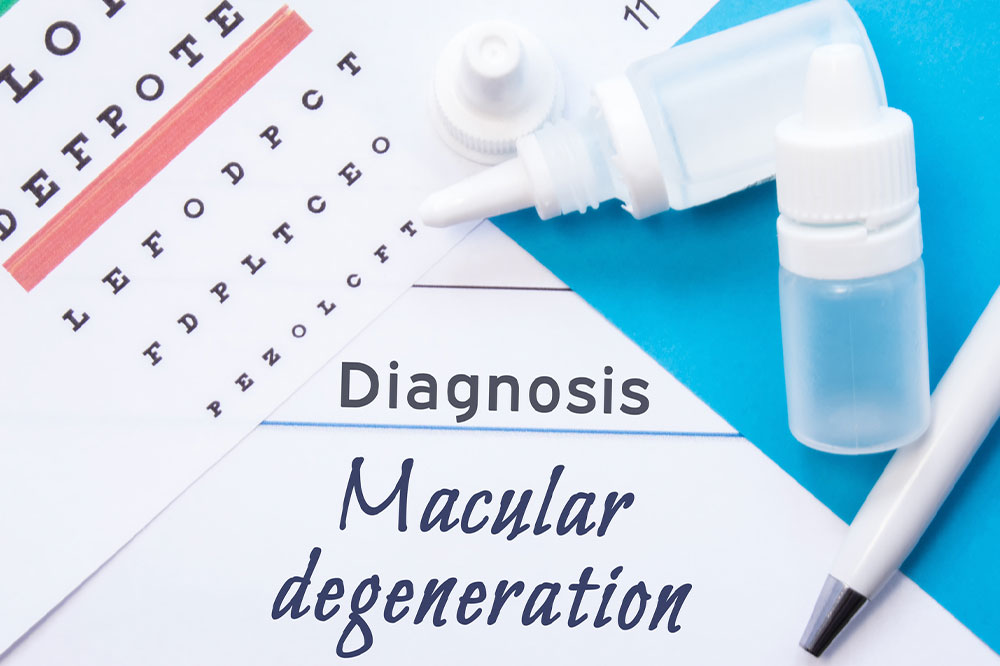Key things to know about macular degeneration

Macular degeneration is an eye disorder that affects the macula, a tiny part of the retina that provides sharp central vision. The most common kind of this disease is age-related macular degeneration (AMD), which affects many people in our country over 60 years. While there is no cure for macular degeneration, several treatments and lifestyle changes help manage the symptoms and improve your vision so that it does not interfere with everyday life.
What are the types of macular degeneration?
There are two common types of the condition:
Wet or exudative macular degeneration
This is the more common type. It occurs when the tiny blood vessels in front of your retina get damaged and leak fluid into your eye, causing swelling, redness, and dampness. The condition can affect your central vision and cause blurry patches in the center. Central vision is the area you see directly in front of you.
Dry or atrophic macular degeneration
Also known as senile macular degeneration, this condition occurs when the retina does not receive sufficient oxygen due to damage from aging; it results in a breakdown of the central part of the retina (the photoreceptors).
What causes this eye disorder?
The risk factors include genetics and lifestyle ailments, such as high blood pressure, high cholesterol levels, and diabetes. But these do not affect vision overnight; it takes years for the effects to show up. Here is a quick look at the many risk factors of macular degeneration:
Age
You are at risk of macular degeneration as you get older, especially after age 55. Hence, older adults are advised to go for regular screenings.
Genetics
You are at a higher risk if one or both parents have this condition.
Past eye injury
Head or eye trauma can lead to loss of central vision in the future.
Specific health conditions
Diabetes, high blood pressure, or heart disease can increase the chances of this disorder. So can eye conditions like myopia (nearsightedness), cataracts, and glaucoma.
Certain treatments
Using certain powerful treatment options for a prolonged, including antihistamines, can affect vision. Therefore, one must always consult a doctor before using any treatment.
The good news is there are ways we can prevent these diseases from becoming dangerous if the signs are recognized in time.
What are the symptoms?
Macular degeneration may not have any noticeable signs initially. But as the condition begins to deteriorate over time, people gradually lose their ability to see clearly. Some lose certain aspects of vision, such as their ability to see shapes, colors, and lines and gauge movement and distance. You may also have blurred, double, overlapping, or blurry central vision. If you have blurred vision, the disorder has likely progressed to a more advanced stage. Some experience flashes of light (called scintillations), wavy lines in the center of the field of vision, and tunnel-like patterns during an eye exam when looking at an object up close. Left untreated, these issues can cause permanent loss of central vision or even blindness.
How is the disorder treated?
After a diagnosis, several treatment options help manage macular degeneration. The most common is laser therapy, which involves delivering light to the eye through an electrical device. The treatment sends energy pulses into the cornea (the clear front part of your eyeball). Laser treatments are effective at slowing or halting the progression of vision loss caused by macular degeneration. Surgery is the next step in treating this condition, especially if you have advanced macular degeneration; the doctor conducts a procedure to replace the natural lens.
In some cases, doctors recommend administering specific treatments directly to affected areas of the eye to reduce swelling and relieve pain caused by scarring or inflammation around them. These treatments are generally used once every week or two until they are no longer needed!
How to prevent macular degeneration?
Macular degeneration can be dealt with and prevented well before it arrives by living a healthy and holistic life. A healthy lifestyle can help lower the risk to a certain extent. Here are some useful tips:
Eat healthy foods
Healthy meals will help your body fight macular degeneration and other age-related diseases. Choose foods high in antioxidants, such as blueberries, which contain flavonoids.
Wear sunglasses
Wearing sunglasses outdoors during sunny seasons prevents harmful UV rays from causing permanent damage to your eyes over time. But ensure to buy the right lenses for maximum benefit.
Exercise regularly
Regular exercise can improve blood circulation, reducing the risk of complications from macular degeneration. It can also promote overall health and well-being.
Follow a healthy sleep schedule
Get enough sleep at night, but not too much (more than seven to eight hours). Excessive daytime napping might cause vision loss over time, making it harder for your eyes to focus on nearby objects during the day.
Control blood pressure
You can do this by cutting back on salt. Excess salt causes our stress levels to rise, leading to hypertension, which eventually leads to type 2 diabetes down the road.
Early diagnosis is crucial in preventing further vision loss. Consult an eye doctor as early as possible if you notice any degenerative changes in your eyesight, such as blurred or double vision. Early diagnosis is crucial because it can slow down or prevent further vision loss. Doctors may recommend an eye exam if you notice the signs early on. If you are over 50 years of age and have experienced blurred vision for the past few months, the expert might suggest a thorough diagnostic test called optical coherence tomography (OCT). Once the problem is identified, the doctor will recommend a suitable treatment plan. There are plenty of innovations to reduce the risks of macular degeneration and prevent it from worsening.
















